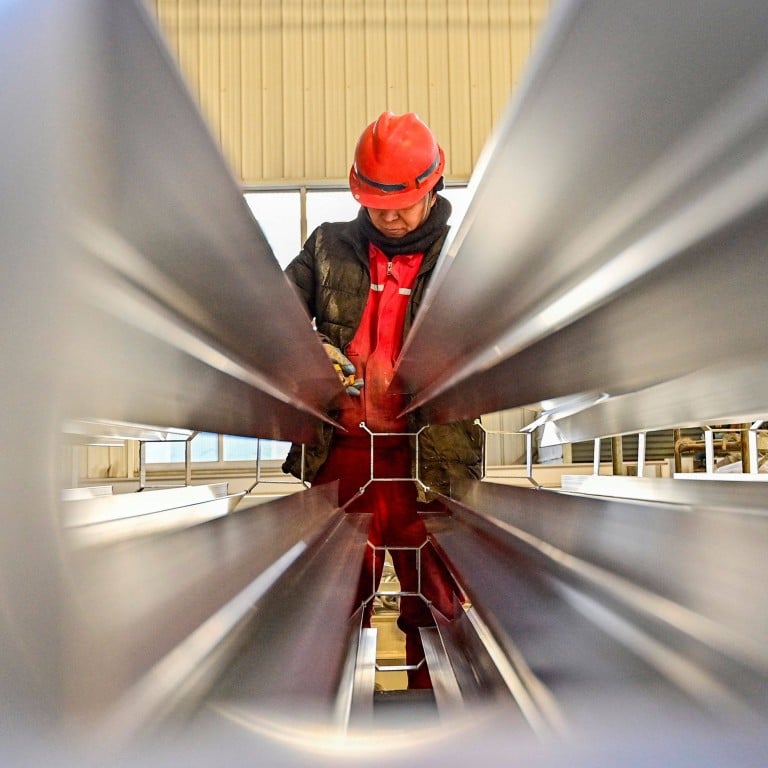
China inflation: demand-led reflation ‘may yet take hold’ as consumer prices suffer steepest fall since 2009
- China’s consumer price index (CPI) fell for the fourth consecutive month in January, while factory-gate prices declined for the 16th straight month
- Risks of deflation have grown due to China’s weaker-than-expected economic recovery, lower food and energy prices and a prolonged property downturn
Deflationary risks are set to remain for China, analysts said, after consumer prices suffered their steepest fall since September 2009 in January, highlighting the issue of weak demand and the impact of the crisis in the property market.
Food prices continued to be the main drag on CPI, while NBS chief statistician Dong Lijuan attributed the year on year decline to a high base from 2023 as the Lunar New Year holiday took place in January last year.
“Looking ahead, a mild reflation is likely in 2024, helped by a favourable low base, while supply-side distortions, including low pork and car prices, should also ease. But with consumer confidence still sluggish, a demand-led reflation may yet take hold,” said Junyu Tan, a regional economist for North Asia at Coface.
CPI improved on a sequential basis for a second consecutive month after rising by 0.3 per cent in January from a month earlier, but this should not be interpreted as a “concrete sign of stabilising demand,” added Tan, due to seasonal factors related to the upcoming weeklong Lunar New Year holiday, which officially starts on Saturday.
Unlike many parts of the world that have experienced inflation in the aftermath of the coronavirus pandemic, China has seen growing risks of deflation.
And as other structural economic challenges rise in areas such as high local government debt, and the slowdown in overall growth worsens, there are increasing concerns that China might experience longer-term disinflation.
Cash payments for households could ease China’s deflation woes, analysts say
The People’s Bank of China (PBOC), though, has dismissed that deflation is an imminent concern for China.
The central bank said core inflation, excluding food and fuel prices, was relatively stable throughout 2023, and that China’s economic growth was still faster than most developed countries.
“China’s low prices were mainly coming from volatility of pork and other types of food, as well as energy,” the Financial News, a publication owned by the PBOC, said on Sunday.
These numbers do not imply China is stuck in a deflationary spiral
And Lynn Song, chief economist for Greater China at ING, believes the risk of a persistent deflation in China is “overstated”.
“While a far cry from the above-target inflation levels seen in many other economies, these numbers do not imply China is stuck in a deflationary spiral,” Song said.
Song added that pork prices, a key component in the CPI basket, would likely pick up due to demand during the Lunar New Year holiday following large declines in inventories.
Food and energy prices have an estimated combined 43 per cent weighting in the CPI basket, which rose by only 0.2 per cent in 2023, compared with a 2 per cent increase in 2022.
Price growth in the service sectors, which carries an estimated 30 per cent weighting in the basket, has been more resilient.
Further recovery will require more efforts from the broad fiscal measure to drive investment demand
But BNP Paribas Asset Management, which manages funds that invest in Chinese equities and bonds, believes that until the property sector recovers, deflation risks remain elevated for China.
“The property woes reflect insufficient easing and have raised the risk of deflation, with the gross domestic product deflator contracting since the second quarter of 2023,” the fund manager said on Tuesday.
The gross domestic product (GDP) deflator is the ratio of nominal to real GDP, which measures the changes in prices for all of the goods and services produced.
Analysts at Haitong Securities believe that while the pressure on the real estate sector still exists, China’s producer price index (PPI) may also be affected.
“Further recovery will require more efforts from the broad fiscal measure to drive investment demand,” Haitong Securities said on Thursday.
China’s PPI – which measures the cost of goods at the factory gate – declined by 2.5 per cent year on year last month, compared to a fall of 2.7 per cent in December, marking a 16th straight month of declines.
The NBS’ Dong said that the moderate decline was largely due to smaller contractions of prices in coal mining and washing, as well as coal, chemical raw materials production, petroleum and other fuel processing industries, electrical machinery and electronics.
Singapore’s UOB Group has adjusted its forecast for China’s PPI in 2024 to a contraction of 0.2 per cent, down from expected growth of 0.1 per cent, due to the weaker readings in recent months.
“We remain watchful of the impact on shipping costs and commodity prices arising from the geopolitical tensions,” UOB Group said.

